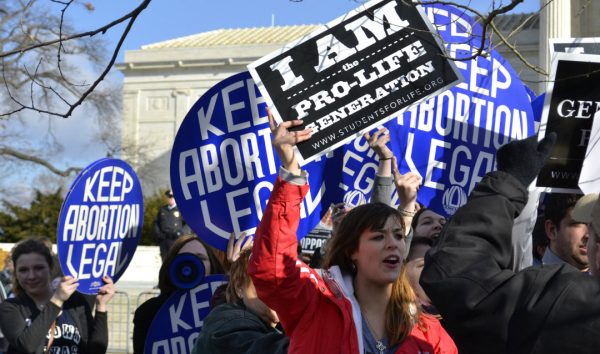In a significant curtailment of women’s rights, the U.S. Supreme Court overturned Roe v Wade, a 1973 landmark decision giving women in America the right to have an abortion before the fetus is viable outside the womb — before the 24-28 week mark. The ruling was expected for some weeks now, after a draft opinion leaked in early May, sending shock waves through the country and sparking protests. Abortion rights — which have been available to women for over two generations — will now be determined by individual States.
Some 20 States have laws (which were overruled by Roe until Friday) restricting or banning abortions, according to data from the Associated Press. Thirteen States have laws banning the procedure, that come into effect, now that Roe has been overturned, according to TheNew York Times’ analysis.
Writing for the court majority, Justice Samuel Alito said that the 1973 Roe ruling and repeated subsequent high court decisions reaffirming Roe “must be overruled” because they were “egregiously wrong,” the arguments “exceptionally weak” and so “damaging” that they amounted to “an abuse of judicial authority.”
The decision, most of which was leaked in early May, means that abortion rights will be rolled back in nearly half of the states immediately, with more restrictions likely to follow. For all practical purposes, abortion will not be available in large swaths of the country. The decision may well mean too that the court itself, as well as the abortion question, will become a focal point in the upcoming fall elections and in the fall and thereafter.
‘Deepened division’
“The Constitution makes no reference to abortion, and no such right is implicitly protected by any constitutional provision,” Justice Samuel Alito, a conservative appointed by George W Bush, wrote for the majority. He called Roe’s reasoning “exceptionally weak” and said Roe and Casey had not brought a “settlement” of the issue nationally, but “enflamed debate and deepened division”.
He was joined by conservative justices Clarence Thomas, Neil Gorsuch, Brett Kavanaugh and Amy Coney Barrett. The latter three are picks of former U.S. President Donald Trump, who had said he would appoint justices who are “pro life” (opposing abortions).
Chief Justice John Roberts, who has become the most centrist among the conservative justices, given the changing composition of the court, upheld a Mississippi law (the focus of the case being decided this week) banning abortions after 15 weeks, but said he would not go as far as overturning Roe.
Decades ago, Roe itself was decided 7-2 , with five Republican-appointed judges joining the majority at the time.
“ With sorrow — for this court, but more, for the many millions of American women who have today lost a fundamental constitutional protection — we dissent,” liberal justices Stephen Breyer, Sonia Sotomayor and Elena Kagan wrote on Friday, adding that the decision “breaches a core rule-of-law principle, designed to promote constancy in the law”.
“In doing all of that, it places in jeopardy other rights, from contraception to same-sex intimacy and marriage. And finally, it undermines the court’s legitimacy,” they wrote.
Justice Clarence Thomas wrote in a concurring opinion on Friday that the court should reconsider “all of this court’s substantive due process precedents…” , naming three precedents that protect contraception as well as same sex marriage and same sex relationships.
Justice Alito , however, limited the scope of the judgment in the majority opinion, writing, “Nothing in this opinion should be understood to cast doubt on precedents that do not concern abortion.”
Why the battle over Roe vs Wade signifies a struggle for America’s future
That the court has a strong conservative bent, which is based on a 6-3 majority, was evident this week. Friday’s decision comes a day after the Supreme Court rolled back restrictions in New York State on who may carry concealed guns in public.
Joining the Alito opinion were Justice Clarence Thomas, appointed by the first President Bush, and the three Trump appointees — Justices Neil Gorsuch, Brett Kavanaugh and Amy Coney Barrett. Chief Justice John Roberts, appointed by President George W. Bush, concurred in the judgment only, and would have limited the decision to upholding the Mississippi law at issue in the case, which banned abortions after 15 weeks. Calling the decision “a serious jolt to the legal system,” he said that both the majority and dissent displayed “a relentless freedom from doubt on the legal issue that I cannot share.”
Dissenting were Justices Stephen Breyer, appointed by President Clinton, and Justices Sonia Sotomayor and Elena Kagan, appointed by President Obama. The said that the court decision means that “young women today will come of age with fewer rights than their mothers and grandmothers.” Indeed, they said the court’s opinion means that “from the very moment of fertilization, a woman has no rights to speak of. A state can force her to bring a pregnancy to term even at the steepest personal and familial costs.”
“With sorrow — for this Court, but more, for the many millions of American women who have today lost a fundamental constitutional protection — we dissent,” they wrote.
‘Tragic error’
Addressing the nation in the early afternoon on Friday, President Joe Biden called the decision a “tragic error” and a “sad day” for the court and the country.
“The court has done what it has never done before, expressly take away a constitutional right that is so fundamental to so many Americans,” he said.
Roe had protected a woman’s right to choose, Mr. Biden said, and “her right to make intensely personal decisions with her doctor, free from the interference of politics”.
Warning to officials
Mr. Biden warned officials, “state or local” ,” high or low” not to interfere in the right of a woman to travel to a State where she could have an abortion.
The President also called on all those protesting the ruling to stay peaceful and said violence was “never acceptable”
Democrats are preparing to take gun control laws and abortion rights to voters this November, when the country heads to the polls in midterm elections.
“This fall, Roe is on the ballot, personal freedoms are on the ballot, the right to privacy, liberty, equality…they’re all on the ballot,” Mr. Biden said.




